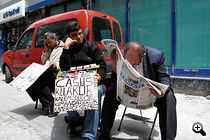Turkey: Minister Says Erdogan’s Bedroom Was Bugged
by Yigal Schleifer

Egemen Bagis, Turkey’s Minister for European Union Affairs, has a penchant for making unpredictable or surprising statements. On Nov. 30, during a talk in Brussels, Bagis dropped another bombshell: opponents of the Turkish government managed to surreptitiously record Prime Minister Recep Tayyip Erdogan’s bedroom conversations. From a Dogan News Agency report in Hurriyet:
Private conversations between Prime Minister Recep Tayyip Erdoğan and his wife in their bedroom were secretly recorded, Turkish EU Minister Egemen Bağış has said.
“Unfortunately, even this country’s prime minister’s personal conversations with his spouse in their own bedroom have been recorded. This is not a simple affair that could be regarded as the freedom of press,” Bağış said at the European Union Press Club in Brussels on Nov. 30.
Speaking in relation to ongoing criticism about the arrest of journalists in Turkey, the minister said no one in the country had been arrested due to their journalistic activities and added that those currently in prison had been incarcerated for their ties to outlawed groups or other groups that sought to overthrow the government via illegal means.
The news should actually not be very surprising. Bugging, wiretapping and video surveillance have become an integral part of the Turkish political, legal and media landscape over the last few years. In fact, in a 2009 In a television interview, Erdogan said he was concerned about his phone being tapped. “What do you think? Of course,” Erdogan answered his interviewer.
“Therefore I watch what I say over the phone. I’m not comfortable speaking over the phone,” Erdogan told his interviewer on Turkey’s private NTV news network.
Hidden camera footage was instrumental in last year’s downfall of Deniz Baykal, the former leader of the opposition Republican Peoples’ Party (CHP), who was recorded having an affair with his former secretary. Several members of the Nationalist Action Party (MHP) were also forced to resign prior to last summer’s parliamentary elections after video footage showing them in compromising situations with young women was released online (see this previous post). From a Eurasianet story I filed last year on the growing fears in Turkey that privacy rights are falling to the wayside:
“My strong view is that what has happened to Mr. Baykal is an offshoot of an environment that has been created in Turkey over the last three or four years. Widespread and systematic violations of privacy and freedom of communication have taken place in this country,” says Sedat Ergin, a columnist with the daily Hurriyet newspaper, another Dogan newspaper.
Wiretaps have been an integral part of the “Ergenekon” investigation, but privacy advocates have accused civil servants of leaking to pro-government newspaper transcripts detailing the occasionally compromising personal conversations of suspects.
“These violations have created a psychological environment. The government has been usually complacent about such violations. They have not made this an issue and have not really taken step to deter such violations. So when there is not deterrence, people think they can engage in such violations and get away with it,” Ergin says.
Turkish officials have rejected the claims that wiretaps are being used as political weapons, saying the number of taps in Turkey is no higher than in other European countries. In the case of Baykal, government officials worked quickly to stop the online distribution of the controversial footage and asked intelligence officials to look into how it made its way online.
But critics say more needs to be done to protect the privacy of individuals. “Turkey is behind European states in terms of the protection of personal information,” says Yaman Akdeniz, a professor of law at Istanbul’s Bilgi University.
via Turkey: Minister Says Erdogan’s Bedroom Was Bugged | EurasiaNet.org.
Originally published by EurasiaNet.org

